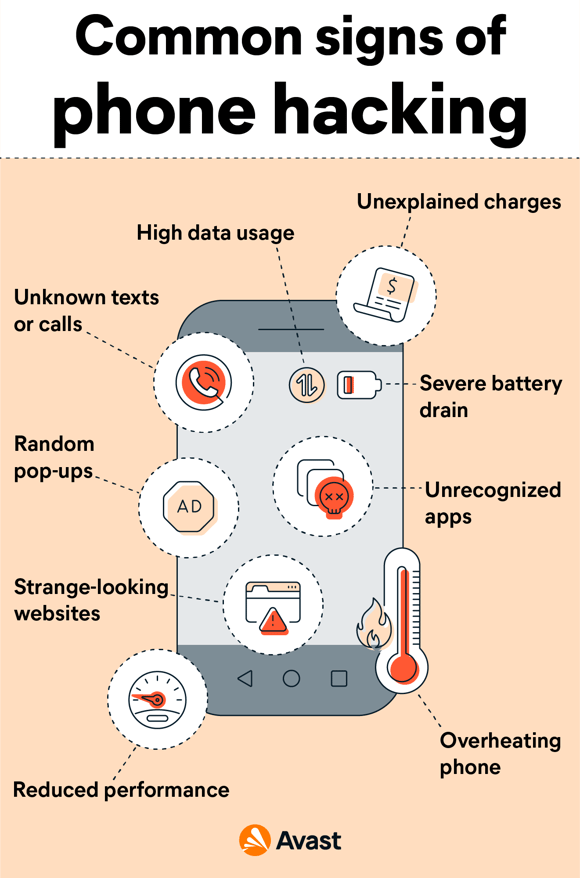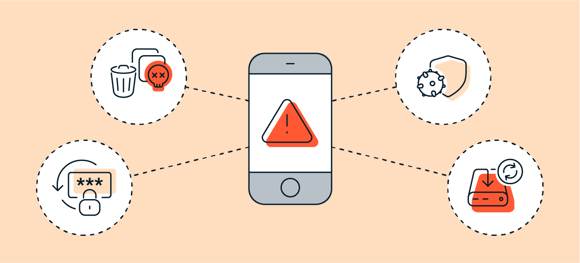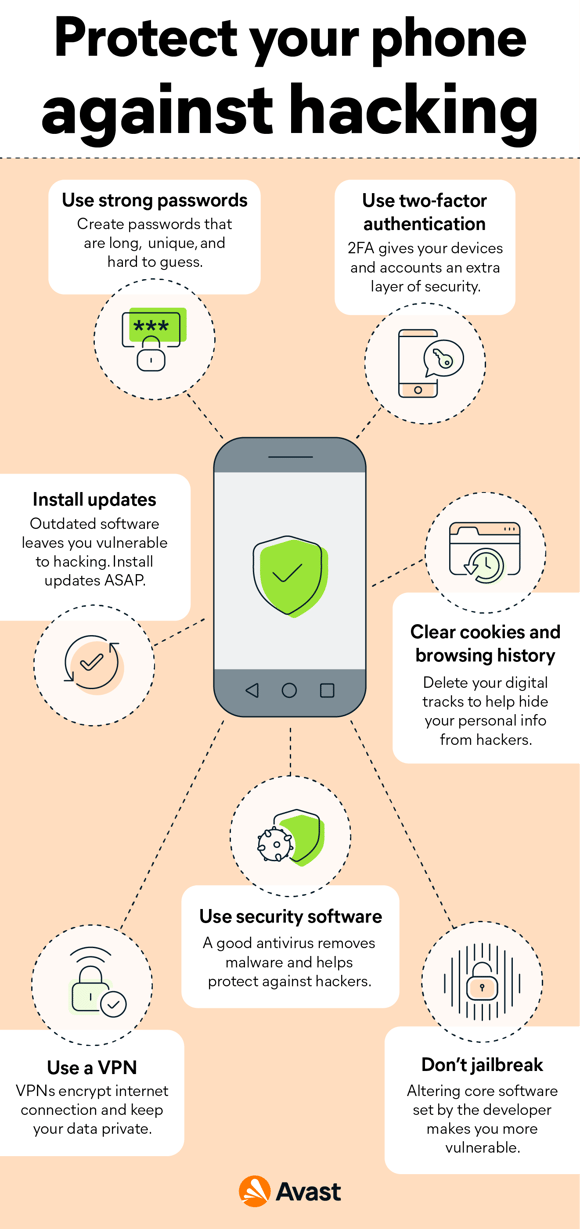Dbz They Try to Hack My Computer Saiyan Danger Sign Pops Up Funny but Its Real
Phones are popular targets for hackers, because they contain so much personal information all in one place. Smartphones hold everything from email and phone contacts to banking and social media details. Hackers can sell this data on the dark web, use it to commit identity theft, or carry out a host of other cybercrimes.
Signs your phone has been hacked
Cybercriminals are always refining their methods — making their attacks increasingly difficult to spot. However, there are clear signs that can help you determine if you've been targeted.
Here are the most common signs of phone hacking:
 Pop-ups
Pop-ups
If you're seeing a lot of unusual pop-up ads, your phone could have an adware infection. Steer clear from these pop-ups — don't click or open them because it could make the problem worse.
 Unrecognized texts or calls
Unrecognized texts or calls
Receiving communications from unrecognized numbers could indicate you've been the victim of a data breach. Don't answer calls from unrecognized numbers, unless you're expecting them or can verify their authenticity.
A hacked iPhone or Android phone can send text messages to all its contacts. If the phone of someone you know has been hacked, your number could be next. Check your call logs for any unusual activity, and if you see a number you don't recognize, consider blocking the contact and reporting it as spam.
 High Data Usage
High Data Usage
If your online activities haven't changed much but your data usage has shot up, it could be a sign of a phone hacker. A malicious app running in the background can cause unusually high data usage. Review your apps and delete anything suspicious.
 Battery drains quicker than usual
Battery drains quicker than usual
Are you charging your phone more often? Does your battery seem to last a fraction of the time it used to? Your phone might simply be getting old, or you could have more than just a battery issue. Unwanted apps installed on your phone via hacking can take over your phone's resources and drain your battery quickly.
 Hot phone
Hot phone
Is your iPhone or Android getting hot and staying hot, even when you're not using it? Like all devices, phones get hot with continued use, especially if you're streaming or gaming for long periods of time.
But if that's not happening and your phone still feels unnaturally hot, something else might be causing it to overheat.
 Reduced performance
Reduced performance
Is your phone dropping calls? Are you not receiving texts or are texts you've sent not getting through? Is your phone freezing, crashing, or unexpectedly rebooting all the time? The culprit may be malware or unwanted background apps draining your phone's processing power.
If you've ruled out hackers, consider fixing crashing apps on Android.
 Websites look strange
Websites look strange
A hacked iPhone or Android phone can be infected with malware that redirects you to sites other than those you want to visit. If websites look odd to you, they might have undergone a redesign recently, or it might mean your phone was hacked and you're being sent to unsafe websites.
 Unexpected charges on your phone bill
Unexpected charges on your phone bill
If your phone bill is higher than usual, you could be incurring unexpected charges from unwanted apps running on your phone and spiking your data use. Fleeceware apps stuff your bill with excess charges, and if someone has remote access to your phone, they might take advantage of your subscriptions and other services.
If you have unwanted subscription fees on your phone bill, consider canceling those subscriptions, and delete infected apps immediately.
 Apps you don't recognize
Apps you don't recognize
Strange apps that you didn't install shouldn't end up on your phone. If you notice an app on your phone that you didn't put there, a phone hacker might be responsible. Of course, some unnecessary apps come pre-installed on new phones (these are called bloatware). So if you don't recognize an app, it doesn't necessarily mean it's malicious.
Everyone uses their phones differently. When it comes to unusual activity on yours, use your best judgement. Sometimes phones with limited storage space or older phones show similar symptoms to a hacked device. So you don't need to immediately assume you've been hacked.
But if you do notice strange apps that are hard to remove, see outrageous charges on your bill, or experience other problems that seem to be caused by a malware infection, take immediate action. Check out our guide to removing viruses on Android or getting rid of malware on iPhones.
Sometimes it's not easy to know you've been hacked. A mobile antivirus program like Avast One will automatically defend your phone from hackers. Avast One regularly scans your device for threats and detects malicious apps before you install them. Plus, it protects against malware-infected links and other security threats on the web.

How can a phone be hacked?
Phone hacking usually requires a victim to take some kind of action before their phone can be hacked. Often, a phone hacker tricks people through a combination of social engineering techniques, technical trickery, and exploiting security vulnerabilities.
Here are some of the most common ways a phone can be hacked:
Phishing
Phishing is a targeted cyberattack that lures victims into clicking a malicious link, downloading a dangerous attachment, or sending personal or other sensitive information. The aim is always to obtain private data from the victim.
Phishing attacks are well-researched and use a targeted pitch as "bait" for specific groups of individuals. All hackers need is a convincing email or iPhone message for the hack to take place. Depending on the private data they catch, hackers can gain access to various accounts and devices, including your phone.
Tracking Software
Tracking software monitors and records device activity. Although web tracking can be legitimate, sometimes it's really spyware that's used by hackers (or even family members) to record and steal private data.
Hackers can use keyloggers and other tracking software to capture your phone's keystrokes and record what you type, such as search entries, login credentials, passwords, credit card details, and other sensitive information.
Wi-Fi and Bluetooth
Hackers can easily break into unsecured wireless networks and steal personal information and spy on private communications. To browse safely on public Wi-Fi , always use a VPN to ensure an encrypted and private connection.
Hackers can break into bluetooth devices, too — so avoid pairing your phone to an unknown bluetooth connection.
Learn how to tell if your bluetooth is hacked and read up on the most secure type of Wi-Fi connections.
What's easier to hack: Android phones or iPhones
Android phones are more common targets for phone hacking than iPhones, mainly because the Android operating system is used by more phones and more people — so there's a bigger pool of targets. But phone hackers are increasingly targeting iPhones, so iPhone users are still at risk.
In other words, just like how Macbooks can get viruses, iPhones can get hacked. But Android devices are generally easier to hack, because of the more open nature of its operating system.
The iPhone's iOS operating system is a closed development environment. Apple does not give out its source code to app or system developers, and its devices can't be modified (unless you jailbreak them). Because it's harder for software engineers to get apps approved on the App Store and installed onto iPhones, it's more difficult for hackers to meddle with iOS devices.
By contrast, Android is an open-source operating system created by Google. Android shares its source code with app and system developers. That makes it easier for developers to create plugins, enhancements, and other modifications. And while this encourages innovation, it also makes Android devices easier to hack.
Regardless of which phone you use, always keep your phone updated to fix OS bugs and patch exploitable security vulnerabilities. And only download apps from trusted sources like the Google Play Store or Apple's App Store.
What should I do if my phone is hacked?
If your phone has been hacked, act quickly to limit the damage to you and your contacts. The idea of a hacker stealing your data is upsetting, but there are simple steps you can take to minimize the danger and fix your hacked phone.
Here's what to do if you have a hacked phone:
Delete unrecognized apps
Review all your apps and check for anything unfamiliar. Hackers can install malware that seems like a harmless background app. Verify the legitimacy of any apps you don't recognize (read reviews, look at ratings) and delete any suspicious apps.
Run anti-malware software
A strong malware scanner and removal tool from a reputable provider will scan your phone to identify and remove anything malicious. This step is essential, because if you miss remnants of an attack, the issue can arise again. Scan your phone regularly to prevent future hacks.
Restore the device
A factory reset can remove most malware — although you'll lose all the data stored on your phone. Before resetting your phone, make a backup of all your contacts, photos, notes, etc.
Reset your passwords
If you've been hacked, don't reuse your old passwords and change your phone's access code. Also, change all your passwords for all the accounts connected to your phone. This includes login credentials for your social media accounts, online banking portals, cloud sharing services, and anything else connected to your phone. And create strong passwords to prevent future security breaches.
 If your phone is hacked, act quickly to delete unusual apps, scan for malware, restore your device, and reset your passwords.
If your phone is hacked, act quickly to delete unusual apps, scan for malware, restore your device, and reset your passwords.
How to prevent phone hacking
Fixing your phone and safeguarding your personal data after a security breach is no fun. That's why it's important to ensure it never happens in the first place. With regular maintenance and good digital hygiene, you can steer clear of hackers while protecting your personal data and devices.
Here are the best security practices to prevent phone hacks:
-
Use strong passwords: Simple passwords are easy to guess. Creating long, unique, and hard-to-guess passwords or passphrases prevents them from being cracked and helps you avoid the fallout of security breaches. Don't reuse passwords for different accounts and get one of the best password managers to keep track of them all.
-
Use two-factor authentication and biometrics: With two-factor authentication (2FA), hackers need more than just your password to access your accounts. And although governmental biometrics usage is dubious, biometric technology (like facial recognition) can help keep hackers away. Make sure you do your research first.
-
Clear cookies and browsing history: The digital data trail you leave behind can be used to create a profile of you and your habits. With a clearer picture of you, hackers can create more personalized, harder-to-detect scams. Delete your browser cookies to keep your information safe in the event your phone is hacked.
-
Install updates: Software is constantly evolving. Updates are a way for developers to fix problems and patch security issues. Always install software updates to make sure you have the best version of your programs. It will run smoother and keep you safe.
-
Use anti-virus software: Even if you're hyper-vigilant, hacks and malware can slip past you. Regularly running strong antivirus software will not only scan and remove any threats on your phone, it'll also give you real-time protection by detecting threats as they emerge.
If you have an Android phone, get Avast Mobile Security for Android. And if you have an iPhone, install Mobile Security for iOS.
-
Use a VPN on public Wi-Fi: Hackers can easily break into unsecured, public Wi-Fi. You need a VPN to ensure an encrypted connection and keep you hidden from hackers and snoops.
-
Don't jailbreak: Jailbreaking (also called rooting) refers to altering core software to avoid restrictions set up by the developer. Jailbreaking works by fundamentally changing your phone's operating system. While it lets you make root modifications to your phone, it also makes you more vulnerable. Without the built-in security of the original operating system, hackers have a better chance to hack your phone and infect it with malware.

Protect against hacks with strong security software
From photos to finances, our personal lives are now inseparable from our phones. Practicing good digital hygiene is essential to avoid hackers. Don't risk your phone getting hacked and your personal data being compromised.
Avast One will detect and alert you in the event of any malware attack. Plus, it will automatically scan your phone to check for any unknown threats, protect your network with a powerful firewall, and keep your passwords safe. Turn your phone into a fortress with Avast.
Source: https://www.avast.com/c-phone-hacking-signs
0 Response to "Dbz They Try to Hack My Computer Saiyan Danger Sign Pops Up Funny but Its Real"
Postar um comentário